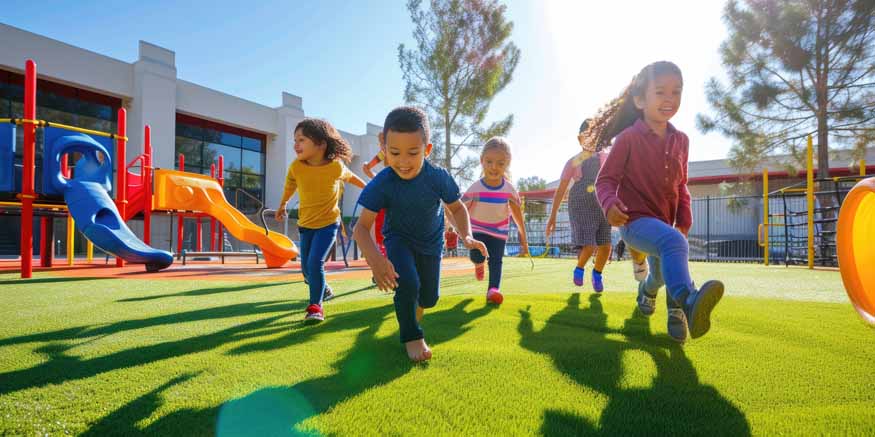Especially if your child is just starting out or moving up to a more competitive level, making sure they are prepared for their next sports season might seem like a big undertaking. However, if you plan ahead and give it some thought, you may assist them in adjusting to the season without any problems. Here are a few ideas for preparing your kid for the upcoming sports season.
Also Read: How to choose right sport for your child
Ways to Prepare for Your Child For Sports Season
Following these tips can help your child prepare for the sports season and improve their athletic performance.
Physiological Preparation
Balanced diet: A well-balanced diet rich in essential nutrients is paramount. Encourage your child to consume ample fruits, vegetables, lean proteins, and whole grains. Hydration is equally vital; educate your child on the importance of staying hydrated, especially during physical activities.
Physical Fitness: A regular fitness regime should be encouraged to improve physical endurance and strength. Activities such as jogging, swimming, or cycling can be instrumental in enhancing your child’s fitness levels.
Adequate Sleep: Ensure your child gets sufficient sleep to aid recovery and maintain a high energy level during training and matches.
Health Checks: Before the sports season commences, schedule a comprehensive health check-up for your child to identify any underlying health concerns that could impede their performance.
Mental Preparation
Resilience Training: Sports can be challenging, and setbacks are inevitable. Develop resilience in your child by teaching them how to bounce back from failures and keep pushing forward.
Goal Setting: Help your child set realistic goals for the season. Goals can be related to skill development, fitness, or teamwork.
Positive Attitude: Foster a positive attitude in your child by encouraging them to enjoy the game and to maintain a positive outlook, irrespective of wins and losses.
Technical Preparation
Skill Development: Prior to the season, focus on skill development. Hire a coach or enroll your child in a training programme to enhance their technical proficiency.
Understanding the Rules: Ensure your child understands the rules and regulations of the game. This knowledge can be a potent tool in strategizing and making informed decisions during matches.
Emotional Preparation
Emotional Regulation: Teach your child techniques to manage their emotions effectively. Encourage them to express their feelings appropriately and to maintain composure during high-pressure situations.
Team Spirit: Nurturing team spirit is crucial. Teach your child the value of teamwork, and the importance of supporting and respecting their teammates.
Gear Preparation
Quality Equipment: Invest in good quality sports equipment that meets all the safety standards to prevent injuries and enhance performance.
Proper Uniform: Ensure that your child has the appropriate uniform, which is comfortable and abides by the regulations set by the sporting authority.
Pre-season Camps: Consider enrolling your child in a pre-season camp to get them accustomed to the competitive environment and help them sharpen their skills.
Friendly Matches: Organise friendly matches to give your child a feel of the real game and to identify areas where they can improve.
First-Aid Training: Equip your child with basic first-aid knowledge to handle minor injuries adeptly.
Safety Drills
Conduct safety drills to prepare your child for emergencies and to acquaint them with the safety protocols.
Parental Support
Encouragement: Be your child’s biggest cheerleader. Your encouragement can boost their morale immensely.
Constructive Feedback: Provide constructive feedback to help your child improve while being mindful not to be overly critical to preserve their self-esteem.
Balanced Approach: Adopt a balanced approach by encouraging your child to excel while ensuring that they are not unduly stressed.
Also Read: Sports: Outdoor Activities for Students
What is sports season in school
Preparing your child for their sports season involves a comprehensive approach that includes physical conditioning, nutritional considerations, mental preparation, and ensuring the correct gear. It’s crucial to remember that while sports are competitive, they should be fun and enjoyable for your child. Your role is to support and guide them, helping them to develop a lifelong love for sport.
The term “sports season” in schools generally refers to the designated period in the academic year during which specific sports are played. These seasons are often divided into autumn (fall), winter, and spring sports seasons, each lasting for several weeks or months.
The actual timing and duration of sports seasons can vary significantly from one region to another, and even from one school to another, due to differences in climate, school calendars, and local traditions.
Typically, each sports season includes regular training sessions, matches or games against other schools, and end-of-season tournaments or championships. Here are some examples of sports that might be played in each season:
Autumn (Fall) Season: This season usually starts at the beginning of the academic year. Common sports during this time might include football, volleyball, cross country running, field hockey, and rugby.
Winter Season: During the colder months, indoor sports become more prominent. These might include basketball, wrestling, indoor hockey, swimming, and indoor athletics.
Spring Season: As the weather begins to warm up, sports such as track and field, baseball, softball, tennis, golf, and outdoor swimming often take place.
However, not all schools follow this pattern, and some sports might be played year-round, particularly at higher levels of competition or in regions with milder climates. Some schools also offer summer sports programs, particularly for students who want to continue training and competing during the school holidays.
Also Read: Importance of Extracurricular Activities for Students
EuroSchool offers students a chance to explore their interests and talents outside of the classroom. We also provide opportunities for students to develop leadership skills, teamwork, and communication skills.









